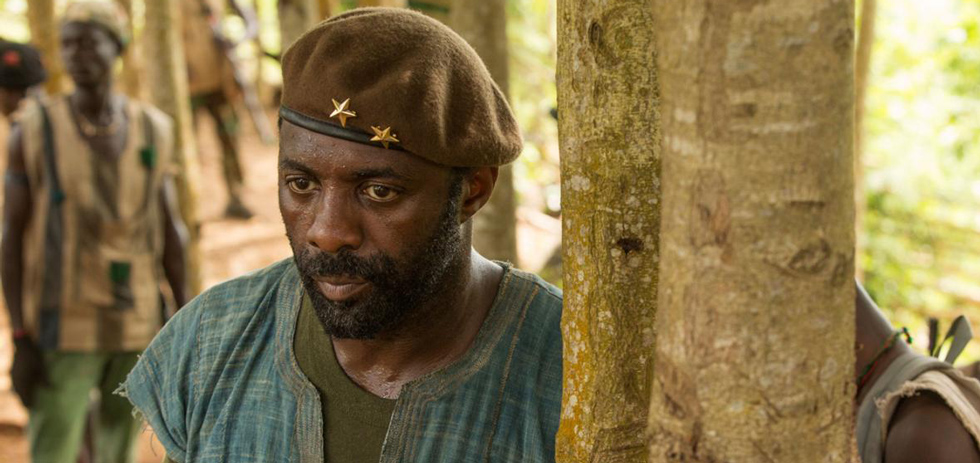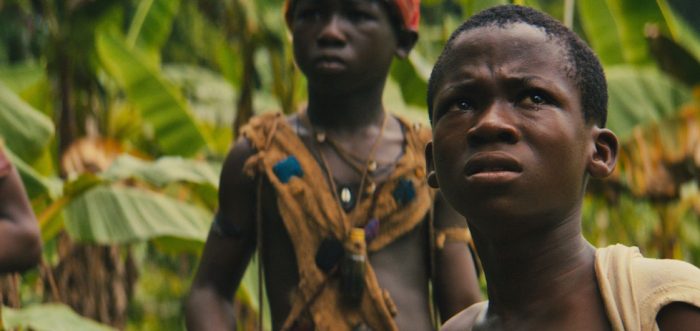
It’s likely no more than mere coincidence that Netflix chose to unleash its maiden feature film acquisition Beasts of No Nation on October 16th, two weeks before Halloween. Though it could be jokingly branded as a sombre slasher flick, Beasts of No Nation clearly exhibits none of the traditional continental hallmarks of horror in that its ghouls are (a) depressingly mortal and (b) devoid of any enjoyable hint of kitsch, being a story of child soldiers and misguided militia. And while it’s very of-the-moment to apply the descriptor of ‘horror film’ to anything sporting a notably sinister undercurrent (from Mulholland Drive to There Will Be Blood), the debasing effect of war is a real-world horror so elemental and so perpetually now that an unspoken exception must be made for the expressionistic likes of Full Metal Jacket, Come and See and, by association, a lesser but still worthy film like Beasts of No Nation. Halloween staples these pictures may never become, but the things that they depict will rarely be topped in the poignancy stakes.
Adapted for the screen from Uzodinma Iweala’s namesake 2005 novel, Beasts of No Nation is Cary Joji Fukunaga’s follow-up to his (arguably) most lauded ‘cinematic’ work: season one of HBO’s True Detective. Not unlike his Emmy-awarded efforts on that cable series, Fukunaga brandishes a deftly controlled blend of watchful remove and dynamic immersion in order to narrate the trip to hell (but not quite back) taken by a young boy turned child solder named Agu, in the wake of full-blown civil war somewhere in West Africa. Having been separated from his family by way of frenzied mass exodus and heartless executions, Agu staggers through an interminably luscious rainforest where he eventually falls into the claws of a scrappy rebel militia led by Commandant, a beret-wearing guerrilla played with relish by the film’s sole A-lister, Idris Elba. Vulnerable and effectively orphaned, Agu is conscripted by this ragtag band of warmongers, many of whom are tinier than their assault rifles and disturbingly prepubescent. With the secret hope of reuniting with the surviving members of his family, Agu goes along with them only to find himself morphing, slowly but scarily, into a killing machine capable of hacking a man to death and beyond with a machete. Unfortunately for viewers, this transformation is not one that can be observed at a safe distance. Fukunaga simply won’t allow for it with his – at times – intimate, restless camerawork, which in itself begins to feel almost too appropriate a choice for portraying a child’s helter-skelter experience of murky conflict; almost too predictable. Yet, this semi-subjective approach is precisely why 14 year-old silver screen debutante Abraham Attah is on the receiving end of so much positive attention, even managing to nab the Marcello Mastrioanni Award for best emerging actor at this year’s Venice International Film Festival where the film had its World Premiere.
Simply put, Attah’s on-screen responsibilities outweigh those of Elba. It’s Agu’s story after all, however many memorable characters fly in and out of the proceedings. While veteran Elba succeeds in injecting some appreciable ‘humanity’ into a character that most viewers would happily dismiss as Satan’s bastard child, the young non-professional plucked from a schoolyard in Accra, Ghana, must somehow demonstrate how Agu’s innocence, his state of shock and fear, and his desire for a family – any family – are inseparable from his propensity for injudicious vengeance and violence; how the latter is borne of the former. The soul of Beasts resides in his ability to not simply be a plain old brainwashed automaton as his tour of duty progresses but, rather, rage-filled, misguided and dangerous, and no less sympathetic for it. More fittingly designed for grandstanding is the role of Commandant, a knowing mix of Colonel Kurtz, the Pied Piper of Hamelin and every dubious foster father you’ve ever seen on screen. In playing a man utterly confident in his powers of seduction, who can orate like Cicero one second and banter like a bro the next, Elba is wise to exploit Commandant’s core narcissism while holding back from going truly big. Elba may very well have garnered more critical attention had he gone the Forrest Whittaker in The Last King of Scotland route, but he is only ever as big (or small) as Agu needs him to be, and never really more prominent than Agu himself.
Oddly enough, one of the film’s truly weak elements is derived almost verbatim from Iweala’s source novel. Anyone who remembers the mild ballyhoo surrounding the book’s release, but more specifically, Iweala’s attempt at recreating the cadence of pidgin English and West African speech, will instantly recognise Agu’s weary voice-over dialogue. Phrases like “I am thinking” and “I am knowing” are meant to sound childlike but dissociated, to evoke the jadedness of youth violated by war. Well, while they may possess expressive power on the page they certainly do not on screen. This is largely a consequence of Fukunaga’s praiseworthy decision to cast ‘locally’ and to have West Africans delivering English lines, whether proper or pidgin, at the risk of alienating audiences who may feel that the accents are unintelligible, which they most certainly are not. The sense of authenticity achieved by this, frankly ballsy, move immediately neutralises, for the most part, Iweala’s stylised prose, rendering it emotionally superfluous. Why Fukunaga felt it necessary to include the voiceover is curious, particularly in view of his aforementioned immersive approach which situates the viewer in Agu’s mental sphere visually and sonically with far more immediacy and vigour. By the same token, this push for authenticity is problematic in some very foot-in-mouth ways.

For a film set in an objectively unnamed state, Fukunaga’s Beasts of No Nation dares to adopt elements of Ghanaian culture, Accra being where the production was largely based. While never explicitly identified, Ghana features strongly in the film’s opening stretch courtesy of characters conversing in Twi, a dialect of the widely-spoken Akan language. Unfortunately, in one fell swoop Fukunaga admirably uses specificity to challenge the notion that Africa is culturally amorphous while concurrently casting a notably conflict-free country as a stand-in for more war-prone neighbours (an admittedly wise logistical decision); unless, of course, Fukunaga is so well-versed in Ghanaian politics that this film is a personal prediction of dire things to come. In all honesty, Iweala’s source novel is as beholden to this particular region of Africa as is Fukunaga’s film, the difference being the latter’s transparency, and its desire to ground the narrative in some semblance of political reality, hence references to the UN and West African watchdog ECOMOG. Where Beasts of No Nation is most likely to come under fire is in its propagation of the ‘issue movie’ trend, especially having been produced primarily by non-Africans. From Hotel Rwanda to last year’s acclaimed French-Mauritanian film Timbuktu, it seems as though movies concerned with the African continent must be about capital ‘I’ issues in order to gain some international traction. Why this is the case is hard to postulate with any certainty. What can be said, though, is that the opening ten minutes of Fukunaga’s film is perhaps the warmest and most generous depiction of everyday life in an African locale – albeit a rural and underprivileged one – that has hit the global mainstream in some time. Even if the film ultimately trades in African Misery™, Fukunaga and his colleagues avoid abject hopelessness by managing to keep the film’s form and aesthetic brisk, aerated and vital. This is no lugubrious Tsotsi.
Somehow, Fukunaga manages not to exoticise while still being fanciful and a touch heightened. His cinema is as seductive as Commandant, luring the viewer only to dole upon them the unthinkable and the unspeakable. Apart from the central performances, Fukunaga’s vision really is the star of the show and a major drawcard, especially post-True Detective, though one shouldn’t forget his sensual, explosive debut Sin Nombre (another film that hinges of gang violence, but in Latin America). Indeed, the sunset hue and pastoral colour palette Fukunaga employs in Beasts of No Nation would seem touristic if it didn’t so strongly evoke a sense of familiarity and homeliness at the film’s outset, approximating an idealised vision of one’s childhood prior to its being stolen. As things begin falling apart, the amber glow takes on a more desaturated, dusty feel, and the scope of the images grows increasingly myopic and stifling as though a mirror of Agu’s semi-indoctrination and detachment. When a cigarette-smoking, gun-toting Agu strolls through a flooded trench, dwarfed by walls of clay-red earth and surrounded by dead things, Fukunaga not only evokes the celebrated sequence in Kubrick’s Paths of Glory, but his own use of longer takes and audacious cinematography. And now that everybody seems to own a curved, 70-inch ultra HD TV, the film’s release on both streaming and in select theatres is a relative non-issue with regards to the preservation of ‘directorial vision’.
Handsome as the picture is, and however much it may benefit from a gigantic screen, Beasts of No Nation lives and breathes on story and character, which it has in spades. It’s probably a little naïve to expect that this Netflix property will induce a seismic socio-political shift in the relevant parts of the world, or that international audiences will attain a more nuanced understanding of the elements that lead to sudden civil and moral disorder in conflict zones, though awareness is never wasted. But as an odyssey through the human condition, from the shores of integrity to depravity and back, Beasts of No Nation is a chilling warning against blind ideology and rhetoric and a guarded celebration of resilience, all dressed up as pretty bracing cinema.
